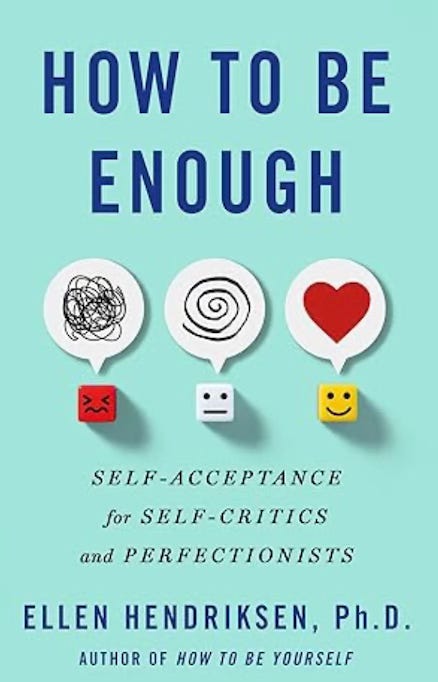Maybe it's not you: 4 ways your anxiety may be a sign of something else
Sometimes anxiety just means you're paying attention
Review of the Week (honestly, maybe Review of the Century), courtesy of Nancy:
I just finished reading How to Be Enough. Outside of the Bible, it is probably the most significant book I have ever read.
Hi everyone!
Have you ever had an experience that reminded you that, fundamentally, you’re just an animal? For example: giving birth, being so hungry it feels primal, feeling part of nature while looking at the stars or the ocean, or contemplating auditioning for Naked and Afraid? Okay, maybe not that last one.
Another “I’m just an animal” reminder is anxiety. Anxiety is a millenia-deep threat response. It’s our cognitive, physiological, behavioral, and emotional reaction to danger.
Updated from the savannah to the twenty-first century, however, if our anxiety makes us suffer (sleepless nights, chronic worry) or gets in the way of the life we want to live (avoiding important social events or forgoing promotions we want), it qualifies as a “disorder.”
But let’s look a little closer at that word, “disorder.”
“Disorder” implies dysfunction: we perceive safe situations as dangerous. Our brain chemistry is off. Our thoughts are “cognitive distortions.” And yes, sometimes anxiety comes from misinterpreting the world.
But sometimes it doesn’t.
Sometimes, anxiety comes from interpreting the world correctly. Remember, anxiety is a normal reaction to a threatening environment. Anxiety doesn’t necessarily mean we’re doing something wrong. It can be a symptom—a flashing red light—that something in our environment is seriously wrong.
Therefore, today, let’s look at four situations where anxiety is a sign that, actually, you are interpreting things correctly.
Anxiety is a normal reaction to discrimination.
A reader named Lily wrote in asking for advice on social anxiety, but as I read her email, a different story emerged.
Lily worked at a male-dominated company in a male-dominated field. In meetings, she was usually the only woman in the room. Even after she led a major project to success, her manager would dismiss her as “ordinary” to her face while praising the exceptional talents of the rest of the team. Male colleagues left her out of important discussions and when questions arose that aligned with her areas of expertise, they asked someone else. She endured “team” lunches where everyone talked over her.
In Lily’s words, “Even though I held the pieces together technically…I feel I fell short—not for lack of ability, but because I couldn’t access it under the weight of everything else.” The experience eroded her confidence and she’s worried she’ll carry the damage to her next workplace.
An environment that subtly or overtly signals, “You don’t belong here,” or “You’re not one of us,” tells us the group doesn’t have our back. As a social species, safety comes from staying in good graces with the group. Therefore, if it’s made clear to us that our race, gender identity, disability, or sexual orientation renders us ineligible for the benefits of group belonging, of course we’ll feel anxious and unsafe.
It’s almost impossible to change an institutional culture by ourselves. But we can build a support system, inside and outside of work. Even if we’re an “only,” we can do our best to team up with like-minded individuals. A sense of community and a reminder that we’re not crazy can buffer us from the stress.
Anxiety is a normal reaction to bad policy.
Anxiety doesn’t have to come from a visible, concrete threat—it can come from something as abstract as law and policy.
In How to Be Enough, I wrote about two studies (this one and this one) that demonstrated a link between discriminatory state laws and perfectionistic behaviors in people who identify as gay, lesbian, or bisexual.
But it’s not just identity-based laws that shape our mental health—economic policies do, too. For instance, a study using 15 years of data in Social Psychiatry and Psychiatric Epidemiology found that stress from unaffordable housing harms mental health, whether the stress is constant or intermittent, and regardless of where our mental health was at outset.
While home prices are often blamed on location, they’re also driven by policy, like laws that allow hedge funds to buy up single-family homes or allow wealthy investors to purchase homes as tax shelters and leave them vacant. Ultimately, laws determine who gets to feel stable and who lives with chronic stress.
Thankfully, it also works the other way: laws can make mental health better. While causality is tough to prove, a study in the American Journal of Epidemiology found that state education reforms in the early 20th century—raising the minimum dropout age, improving student-teacher ratios, and lengthening the school year—contributed to better mental and physical health outcomes decades later, especially among older Black adults.
To sum it up, policies that take care of people improve mental health.
Anxiety is a normal reaction to impossible standards.
Victoria Garrick Browne, whom I talked with on her podcast RealPod, was a Division I volleyball player at USC and kick started her career with a TedTalk about athletes and mental health—specifically, how the impossible standards of D1 sports took a toll not only on her mental health, but on untold numbers of other athletes.
She described what the researcher Dr. Andrew Hill calls a “perfectionistic climate.” Specifically, Victoria remembers that the whole team had to show up for 6 AM punishment runs if one member was even one minute late to practice. She recalls an impossible schedule including weekly out of state air travel, five-hour practices five days a week, four-hour pre-meet warmups, and missing 40% of her classes due to all the practice and travel. It was a schedule no human could keep, especially while trying to pass an econ midterm.
Of course Victoria’s brain responded with anxiety, depression, and burnout. D1 volleyball was supposed to be intense and competitive, but not a meat grinder that crushed her spirit before she even turned twenty.
Dr. Hill calls a perfectionistic climate a social environment that communicates the expectation that your performance must be perfect, and that less-than-perfect performance is unacceptable. It includes unrealistic expectations, harsh criticism, anxiousness about mistakes, and conditional regard—which is just the technical way of saying you get approval only if you perform perfectly.
Division I women’s volleyball qualifies as a perfectionistic climate, but so does elite ballet, the academic grant application process, orchestra auditions, medical residency, and top college admissions, just to name a few. Heck, I’d argue all of social media is a perfectionistic climate.
An antidote? Dr. Amy Edmonson pioneered the concept of psychological safety, defined as a shared belief that a team environment is safe for interpersonal risk taking. Team members, from the top surgeon to the lowliest med student, for example, believe they can speak up, ask for help, and admit mistakes without fear of humiliation, rejection, or punishment.
Most importantly, across studies, psychological safety leads to better task performance. Why? Teams with high psychological safety did more of what’s called learning behaviors, meaning they asked for feedback, sought help, or experimented with new ideas. In turn, more learning behaviors predicted better team performance, as measured by external observers.
Anxiety is a normal reaction to being dependent on someone unstable, hypercritical, unreliable, or abusive.
A client we’ll call Annie is a stay-at-home-mom who told me that as soon as she opens her eyes in the morning, she starts to worry about her day, her life, her future, her four kids, and their future.
Annie initially framed her anxiety as a character defect, but as I got to know her, it came to light that her husband was cheating on her (for the third time), she knew nothing about their family finances, and he was actively blocking her from learning more. She slowly acknowledged that she was in a situation that would make anyone anxious—she had neither control over her situation nor the necessary knowledge to weigh her options.
Annie and her four kids are dependent on her partner financially, but any of us might also be dependent due to our immigration status, our health, or the fact that we’re still a child under our parents’ roof. Indeed, anxiety often starts in childhood as a survival skill. If we grew up with parents who might be irate, abusive, under the influence, or absent at any moment, constantly scanning for signs of trouble and staying on high alert was likely a helpful adaptation to stay safer.
In sum, anxiety is a normal reaction to a psychologically unsafe environment.
Sometimes, anxiety comes from within. Our internal security system might be calibrated a little too sensitively due to our wiring or learned experience. But sometimes anxiety comes from outside of us—it’s a signal, an alert. It’s trying to tell us that our environment is not safe. And then, it’s vital that we listen.
Often, blaming ourselves is more straightforward and concrete than blaming workplace culture, institutionalized discrimination, cutthroat competition, childhood circumstance, or late-stage capitalism.
I’d be a hypocrite if I didn’t wholeheartedly recommend therapy for anyone suffering, but don’t mistakenly reinforce the idea that your anxiety means the problem lies with you.
What can you do besides therapy? We may not be able to change a situation ourselves, but we can:
Build trusting relationships with allies: friends, teachers, colleagues, like-minded individuals. Even small pockets of support can protect us from larger dysfunction.
Model safe behavior strategically: without putting ourselves on the line, we can model what we want to experience—admitting minor mistakes, being curious, inviting input, asking for advice. We may not be able to change the larger situation, but we can model micro-changes.
Advocate for ourselves and others: that might include setting boundaries when safe, backing up others when they do the right thing, and teaming up to push for change.
Leave: we can quit or otherwise get out. Most people don’t want to leave; we love our job, our partner, our volleyball teammates. But at a point, our self-preservation becomes more important.
To wrap it all up, if you’re feeling chronically anxious, don’t just ask what’s wrong with me, but also what’s happening around me? Anxiety may not be a malfunction—it may be a message. Then, the goal isn’t to silence the alarm, but to understand what it’s warning us against.
Do you find this newsletter useful? If so, please tell one person you care about. Even in our digital world, a word of mouth recommendation is still the most valuable.
Be kind to others and yourself!













Yes! Such an important and rarely-heard message. I'm reading a great memoir ("Acceptance" by Emi Nietfeld) that is all about the author's experiences being diagnosed with mental "disorders" as a child, when she was essentially having reasonable reactions to an abusive and chaotic situation. As soon as her environment changed, she felt better. It also reminds me of Lena Dunham's essay about how she thought she was an anxious mess her whole life and really allowed that to define her self-perception. Same thing — when she moved out of NYC, the anxiety evaporated.
Thank you for providing a framework of understanding based on examples, evidence and environments. Your outlined strategies consistently offer practical application. Always a helpful read for personal reflection and personal application. Blessings